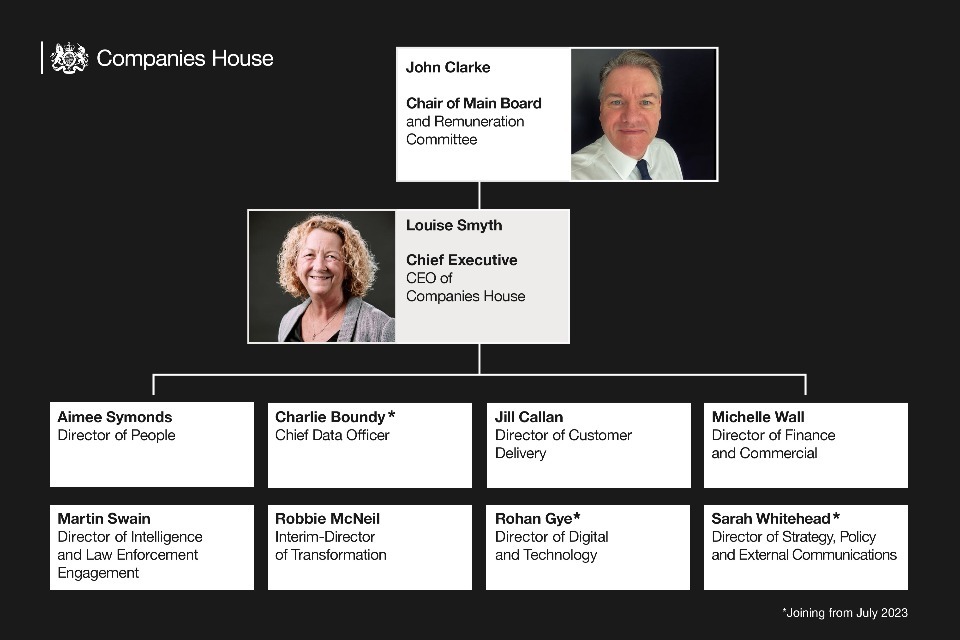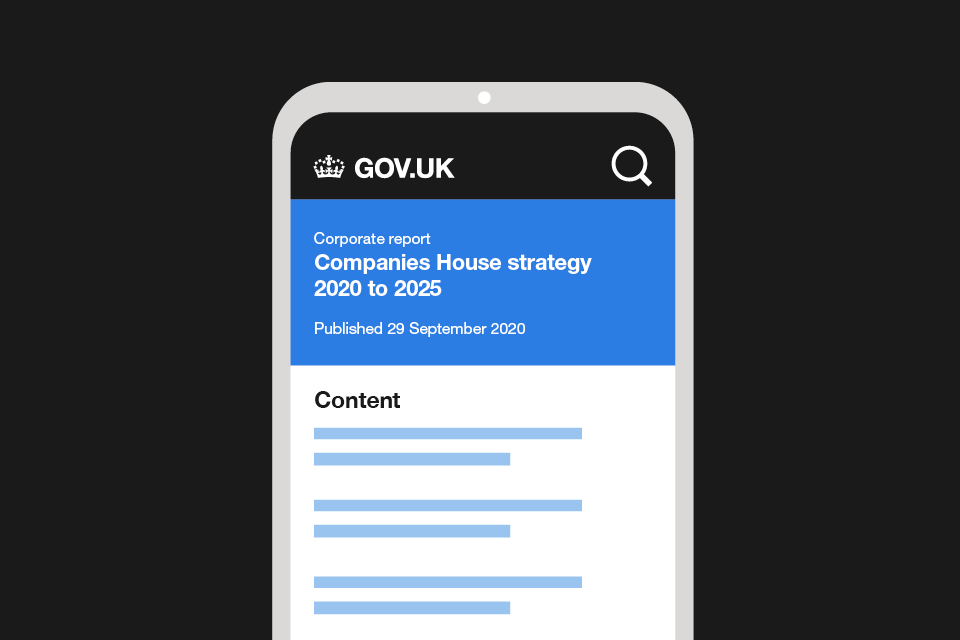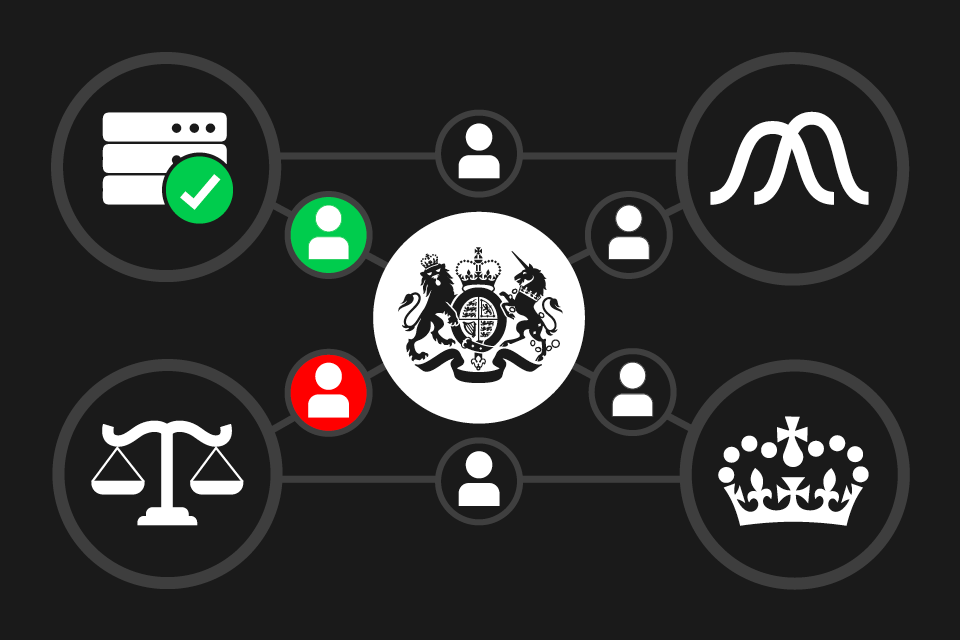Companies House business plan 2023 to 2024
Published 12 July 2023
Chair and Chief Executive’s foreword
This plan marks year 4 of our 5-year strategy. It’s particularly significant as we’re on the cusp of new legislation that we’ve been working on for a long time, and is now coming to fruition.
We welcome the reforms set out in the Economic Crime and Corporate Transparency Bill, which is anticipated to become law in 2023. This is a significant moment in the history of the UK companies register and brings about the biggest changes to Companies House since 1844. It’s the beginning of an exciting future for Companies House.
Back in 2020, we set out our 5-year strategy with the vision to be the most innovative, open and trusted registry in the world. We knew that delivering this vision would require both legislative reform and organisational transformation.
Through our transformation programme, we’ve:
- made more information publicly available and accessible
- introduced a new register – the Register of Overseas Entities (ROE)
- improved services so they are easier to use
- increased the uptake of digital services
- introduced a new service model to better serve our customers
The measures in the Bill will take us a significant step closer towards realising our vision as they fundamentally change the role of the registrars and the legal framework in which we operate. They will enable us to play a much stronger role in making the UK a great place to do business, while also placing us at the centre of the UK government’s approach to tackling economic crime.
Over time these changes will allow us to actively improve the integrity of our registers like never before, inspire greater trust in our data and help us to drive confidence in the UK economy. As we implement these changes, it’s important that we maintain a balance between tackling economic crime and the ease of doing business for law-abiding companies.
Thanks to the commitment and hard work of our brilliant people, we’re ready to begin translating legislation into practice and to deliver a reformed Companies House, which is fit for the future. The scale of the changes involved cannot be underestimated, but we’re excited to contribute further to both the growth of the UK economy and tackling economic crime for years to come.
John Clarke - Chair of Companies House
Louise Smyth - Chief Executive and Registrar of Companies for England and Wales.
Introduction
Companies House is an executive agency of the Department for Business and Trade (DBT). Our purpose is to drive confidence in the economy and help make the UK a great place to start and run a business. We support millions of businesses to fulfil their statutory obligations throughout a company’s lifetime from incorporation to dissolution. Entities that benefit from limited liability in exchange must comply with standards, transparency and accountability. This gives confidence to businesses, investors, society, consumers and the UK economy as a whole. More than 5 million limited companies are registered in the UK. Over 750,000 new companies are incorporated each year.
Our data on registered companies is made publicly and freely available to help inform millions of business decisions each year. In the last year, our data was accessed over 12 billion times and is used by a wide range of people including businesses, researchers, government and many public bodies, as well as the general public. We’re always seeking new and innovative ways to make company information even quicker and easier to search and add even more value to the company information people can search and use. By doing so, we create greater transparency and promote growth in the UK economy.
That same information also supports a range of government departments and other partners in their decision-making, including partners in financial sectors who spot discrepancies and suspicious activity. Reporting these to us further enables us to investigate and take action where appropriate.
We also actively share intelligence with law enforcement partners and other agencies. Through multi-agency collaborations, our data and intelligence support a wide range of investigations and aid partners to use their powers to tackle money laundering, organised crime and fraud.
The integrity of the data is very important to us and the users of our data. As custodians of company information and with the new powers available to us from 2023, we will carry out new checks on the information submitted by companies and be able to take appropriate action to annotate, reject or remove information. By continuously improving the accuracy and integrity of our data, users will trust and use them even more, and this drives confidence and growth in the UK economy.
Who we are
Over 1,000 people work for Companies House throughout the UK, with offices in Cardiff, Edinburgh and Belfast.
The Registrar of Companies is registered in England and Wales and the Chief Executive of Companies House is Louise Smyth, who is based at Companies House in Cardiff. The Registrar of Companies for Scotland is Lisa Davis, based in Edinburgh. The Registrar of Companies for Northern Ireland is Lynn Cooper, based in Belfast.
The Economic Crime and Corporate Transparency Bill significantly enhances the role of the registrars. A new set of statutory objectives for the registrars will be introduced and aimed at improving the accuracy and integrity of register information and safeguarding against creating false or misleading impressions and unlawful activity.
Our organisational chart shows how our management is structured.

The Chief Executive and Registrar and all executive directors of the business constitute the executive board. The main board of Companies Houses consists of the chair, the chief executive, executive directors and non-executive board members, and:
- handles all aspects of our organisation, including performance, finances and strategic direction
- reports to DBT on our governance, strategy, priorities and progress
Our vision and strategy

Our vision is to be the most innovative, open and trusted registry in the world, with brilliant services delivered by brilliant people.
Our strategy for 2020 to 2025 sets out an ambitious vision requiring a transformational change to Companies House over this 5-year period with a strengthened focus on preventing and tackling economic crime. This business plan sets out what we will deliver in year 4 of this strategy.
Over the 5 years, we’re focused on 6 strategic goals to achieve our vision.
Our strategic goals are:
- our registers and data inspire trust and confidence
- we maximise the value of our registers to the UK economy
- we combat economic crime through the active use of analysis and intelligence
- our brilliant services give a great user experience
- our culture enables our brilliant people to flourish and drives high performance
- we deliver value through the efficient use of resources
The external landscape
The UK has one of the largest and most open economies in the world. It has a reputation as a global leader in corporate transparency, which underpins confidence in the economy. Companies House plays a pivotal role in making the UK a more transparent, efficient and effective place to do business.
However, it’s also well acknowledged that this openness exposes the UK to the risk of criminals who want to use our corporate structures for illicit purposes. The UK government’s Economic Crime Plan sets outs the greater role that Companies House could play in preventing and tackling economic crime through the introduction of new legislation to bolster the registrars’ powers. In 2023, we expect to be able to begin using these new powers, enabling us to make a greater contribution to the economic crime ecosystem.
The Economic Crime (Transparency and Enforcement) Act 2022 was brought forward and expedited as part of the UK response to the invasion of Ukraine. Immediately, we built and launched the new Register of Overseas Entities in August 2022, requiring overseas entities that own land or property in the UK to declare their beneficial owners and/or managing officers. By the end of January 2023, all entities in scope were required by law to register. During the period of this plan, 2023 to 2024, Companies House will continue to encourage compliance from those who have not registered. Entities that do not comply can be liable for criminal offences and financial penalties and could be unable to deal freely with their land because of restrictions placed over it.
Following this Act, the Economic Crime and Corporate Transparency (ECCT) Bill was introduced later in September 2022 and is being scrutinised in both the House of Commons and the House of Lords. It is anticipated to become law in 2023, as the second part of a legislative package to prevent the abuse of UK corporate structures and tackle economic crime.
This plan has been prepared with due consideration given to the economic climate in which we’re operating. This presents real challenges, not only for companies but also with the running of our own organisation, because of higher operating costs and labour market challenges. As a result, we are prioritising our work based on the resources available to us and making sure we utilise our financial and people capacity efficiently.
Technological advancements continue to be made at a rapid pace and we must continually adapt and grow with new and innovative digital services that reflect customer expectations and needs. As part of our transformation journey, we’re improving the ways our services and the information we hold on our registers can be accessed. Many of our transactions have already been digitised as part of our transition to a digital-first organisation. This also comes with a greater need to securely protect our data and digital infrastructure from cyber threats.
Many of the challenges and opportunities we face in the UK are shared across the world. On the international stage, Companies House continues to be well regarded and we endeavour to learn from and collaborate with other business registries and partners. We play a leading role in the Corporate Registers Forum (CRF) and European Business Registry Association (EBRA), two of the leading international associations of business registries. We’re also sharing our own journey and learning with our counterparts as we implement new legislation and our transformation programme.
What we plan to deliver
This plan marks the beginning of year 4 of our 5-year strategy, which includes prioritising the implementation of new legislation coming into force in 2023. In recent years, we focused on delivering improvements that did not require changes to legislation, and which were laying the foundations for this moment.
This year, the changes related to legislative reform involved starting to cleanse existing incorrect information on our registers where the new powers allow us to do so, implementing the next phase of the Register of Overseas Entities, and sharing more data proactively with partners to help tackle economic crime.
We will also have secured a solution as part of our preparations to implement identity verification (IDV). Subject to secondary legislation, all new and existing registered company directors, people with significant control (PSCs) and anyone else filing on behalf of companies with the registrars will be required to verify their identities.
We’re taking a prioritised and phased approach to implementing the new legislation aligned with our resources and legislative timetables while minimising the potential impact on businesses during the changes. Some of the commitments in this plan are subject to secondary legislation being secured.
We’ll be working at pace to implement these changes as quickly and efficiently as possible. However, it will take time to fully implement and see the full impacts and outcomes of our ambitious programme. Our ambition is that the data we publish and share with others will be cleaner because of our querying, annotation and removal of information. This will drive confidence in the UK economy and assist in the overall cross-government approach to tackling economic crime.
Taking action to improve the accuracy of our registers and tackle economic crime

Delivering prioritised areas of the new legislation this year will contribute significantly towards achieving our strategic goals.
To progress towards the strategic goal of ‘our registers and data inspire trust and confidence’, during this period we will:
- implement a compliance framework that sets out our approach to using the new powers, taking proportionate and effective action
- query information identified as potentially fraudulent, suspicious or which may otherwise present a risk to the integrity of our registers, initially based on known and common misuses or errors
- remove information, which presents a risk to the integrity of our registers
- use new powers to annotate register information, starting with instances which are creating a false or misleading impression to the public
- issue financial penalties where the registrars are satisfied, beyond a reasonable doubt, that a relevant offence has been committed
- encourage compliance of overseas entities in scope that have failed to meet their legal obligations and may also be subject to sanctions, including financial penalties
- secure a suitable identity verification solution and commence integration within our existing services and systems as part of our preparations to verify the identities of individuals who register and file with Companies House
- implement new data governance, quality and ethics frameworks to lay the foundations to enhance our management, use and analysis of data
Implementing the next phase of the Register of Overseas Entities
Launched in August 2022, this new register is the first of its kind in the world. Entities from outside the UK that own land and/or property in the UK are required to register with Companies House. This is making the identities of beneficial owners and/or managing officers transparent to those who access the public register. The register is also a vital new information tool for law enforcement agencies to use to help identify those who may be using UK property for unlawful activities, such as laundering money.
All overseas entities in scope needed to register within a 6-month transition period by the end of January 2023. We’re now focused on encouraging compliance and identifying those who have failed to comply and where sanctions may be applicable. We’ll be further developing the register’s functionality, including the service for updating or removing information.
Utilising new powers to query and remove information from our registers
We’ll begin using the new powers to query information that we suspect to be false, fraudulent or inaccurate, and, where appropriate, it will be removed from our registers. We will not use the new powers to query information in every case or filing.
In this first year, our intentions will be to target known misuses and respond to suspected fraud and other suspicious activities that pose the greatest threat to the integrity of the information that we hold.
We recognise that preventing misinformation from getting onto the registers in the first place would be preferable and, in this period, we will begin to use the new powers to query some information prior to registration.
Preparing for identity verification (IDV)
Identity verification (IDV) is one of the significant measures being introduced through the Economic Crime and Corporate Transparency Bill. All new and existing registered company directors, PSCs and anyone else filing on behalf of companies will need to verify their identity in order to provide assurance that they are who they claim to be. They will be able to either verify their identity directly with Companies House or through an Authorised Corporate Service Provider (ACSP). It will also apply to corporate general partners of limited partnerships and individual directors of corporate directors, increasing transparency and limiting their potential for misuse. Secondary legislation will be required before we can commence identification verification.
This year, we will be making necessary preparations including the need to make changes to our systems and processes to integrate with a new IDV service. We will be communicating with companies to inform them of their new obligations in advance of these new requirements taking effect. We will also be preparing the processes for identity verification to be undertaken by individual ACSPs.
Strengthening our approaches to producing and sharing intelligence

Our intelligence service has built strong relationships with partners in government, the regulatory and law enforcement sectors and the private sector. We’re playing an increasing role as a member of a wider range of networks. We established an intelligence hub to support the creation and sharing of intelligence and have developed a much greater understanding of how our data can be used by and shared with partners.
This places us in a strong position to start proactively sharing information to help prevent, detect and investigate economic crime.
We’ll also be able to cross-check intelligence with partners. This will enhance our opportunities to identify suspicious activity, investigate and take action where appropriate. As a result of working even more closely together, the most suitable and effective actions can be taken in the interest of tackling economic crime and criminality.
Our active use of analysis and intelligence to combat economic crime is one of our strategic goals. During this period, we will:
- proactively share information with law enforcement agencies and other partners where deemed appropriate by the registrars, including through new formal partnership arrangements to facilitate the efficient exchange of intelligence
- expand our intelligence hub’s capabilities in identifying suspicious activity and producing key intelligence products
- undertake strategic intelligence assessments and implement control strategies targeting our resources at the greatest threats to the integrity of our registers and the UK economy
- strengthen our investigation of discrepancies with our PSC data, as reported to us by obliged entities in line with new anti-money laundering regulations
Increasing the value and use of our data

Through our work to improve the accuracy of our registers, we build trust and confidence in the data we make publicly available. In doing so, we expect the use of our data to grow and broaden, creating additional value for the UK economy.
We are always seeking new ways to increase the company information we publish and to improve its accessibility so that it can be used easily. This will increase the value of the information we share and drive economic growth.
To progress towards our strategic goal of ‘we maximise the value of our registers to the UK economy’, during this period we will:
- communicate the changes coming into effect in 2023 because of new legislation
- make company accounts information more accessible with new search functionality and an ‘at a glance’ view of this key financial data
Providing brilliant services

During this period, providing brilliant customer and digital services remain priorities for us, even though this may be challenging at times of reform. We have continued to set public targets relating to customer satisfaction and the availability of our digital services, which we have refined to reflect our operating environment. They represent the importance of brilliant services to the organisation and the people who interact with us and access our registers.
We’re committed to communicating effectively to make people aware of the changes to their obligations under the new legislation. By taking a firm but fair and evidenced-based approach to using the new powers, we’ll find a balance between tackling economic crime and minimising burdens on law-abiding companies, which make up the vast majority of entities on our registers.
As part of our strategic objectives to progress towards becoming a digital-first organisation, this year we’re also re-platforming and enhancing digital services to improve the ease of doing business and help users get it right first time when engaging with our services.
To progress towards our strategic goal of ‘our brilliant services give a great user experience’, we will:
- inform customers and their agents of their legal obligations including those arising from the implementation of the Economic Crime and Corporate Transparency Bill
- enhance confirmation statement service to enable new legislative requirements such as providing new information, for example, a registered email address
- develop a new online user journey for making changes to the director and PSC information
- digitise further insolvency paper documents to offer a more efficient process for users and realise the benefits of automation
- develop a full end-to-end digital service for providing certificates and certified copies of documents filed at Companies House
- prepare our approach to increase digital communication with customers, including for bulk correspondence, arising from the collection of registered email addresses, in line with our digital-first ambition
- continue to improve our digital infrastructure and internal systems, including security enhancements and our use of cloud-based technology, to ensure we offer modern and reliable services
- work with HM Courts and Tribunals Service to onboard to their service for referring prosecution cases digitally
Delivering within our resources

We have finite financial and human resources and this plan represents an ambitious yet pragmatic programme of work. We have prioritised the implementation of aspects of the Economic Crime and Corporate Transparency Bill while optimising the delivery of the remaining commitments in our 5-year strategy and balancing this with the ongoing maintenance of our existing core business.
We’re committed to managing our resources efficiently and effectively and delivering value for money to the taxpayer, working in accordance with good governance, functional standards and statutory guidance.
To progress our strategic goal of ‘delivering value through efficient use of resources’, during this period, we will:
- work with external delivery partners and specialist suppliers to provide us with the increased capacity and capabilities to deliver the changes ahead
- review our fee regime to ensure it reflects our running costs including our new responsibilities
- embed the Public Value Framework to ensure and demonstrate how we’re maximising the value of the public funding we receive
- optimise our working environment to deliver hybrid working and maximise our use of government estate
- contribute towards the Greening Government Commitments 2021 to 2025 showing our commitment to reducing our impact on the environment
Our people are central to delivering this plan. They embrace and drive change at Companies House and have created a positive and inclusive culture that has underpinned our transformation journey. In addition to continuing to invest in the development of our people, we will be recruiting for new roles and expertise in order to be able to deliver the new legislation in key operations and intelligence areas. Our focus will be to ensure we have the right people in place with the right skills as we begin delivering the new powers.
To progress our strategic goal of ‘our culture enables our brilliant people to flourish and drives high performance’, during this period we will:
- continue building our employer brand to attract and retain a diverse talent pool, ensuring we’re representative of the customers we serve and have the resources and skills to deliver legislative reform
- use our strategic workforce plans to ensure we have the right people in place at the right time, with the right skills to support our future strategic outcomes and objectives
- invest in the development of our people through professional skills development pathways, aligned to the Civil Service Professions Framework
- develop leadership skills across the organisation to enable and inspire change
- deliver targeted learning and development for colleagues operating with the new powers and embed an investigatory mindset in their decision-making as we query more information
- deliver data literacy training to support our work in embedding new and enhanced data governance and increasing our overall data maturity
Fees and funding
Companies House is funded through fees and funding from the Department for Business and Trade. Fees are charged for services, as set out in legislation, and they are set on a cost recovery basis in line with managing public money and reinvested into the organisation. Funding for our 5-year transformation programme (2020 to 2025) to support the implementation of the strategy was secured through the comprehensive spending review in 2021.
We also issue financial penalties, for example, for company accounts filed late with Companies House. These are paid entirely to HM Treasury.
From 2023 to 2024, we will also receive funding over a 3-year period from the Economic Crime Levy to support our activities to help identify and tackle money laundering.
At the time of writing, the commitments and activities set out in this business plan, and the resources necessary to deliver on them, are costed and resourced within the financial allocations shown below. They are, however, dependent on securing the necessary funding from the government, assumptions around fee income and the timings of new legislation being in place.
These tables set out the anticipated financial allocation for 2023 to 2024 and indicate future year’s fees.
Budget (£m)
| Budget (£m) | |||
|---|---|---|---|
| Delegation | 2023/24 | 2024/25 (indicative) | |
| Resource | |||
| Transformation and service delivery | 9.6 | 8.3 | |
| Depreciation | 9.8 | 10.4 | |
| Economic crime levy | 2.0 | 4.3 | |
| Financial penalty regimes | 12.0 | 19.0 | |
| Capital | |||
| Transformation and service delivery | 17.4 | 15.5 | |
| Estates maintenance | 0.7 | 0.7 |
For 2023 to 2024 only
| Budgets | Resource (£m) | Capital (£m) |
|---|---|---|
| Service delivery - income | (126.0) | |
| Service delivery - expenditure | 126.0 | 2.5 |
| Transformation | 9.6 | 14.9 |
| Depreciation | 9.8 | |
| Economic crime levy | 2.0 | |
| Financial penalty regimes | 12.0 | |
| Estates maintenance | 0.7 |
Future fees
Legislation is required so that we can charge fees to recover costs associated with the new investigative and enforcement activities. As such, we aim to undertake a review of the fee regime during 2023 to 2024 to reflect the operating costs of implementing these new powers and to provide a more sustainable funding model.
Monitoring and reporting
Throughout this reporting period, our progress against the business plan will be monitored and subject to regular review, including our annual public targets. An implementation plan is in place, which underpins our delivery and monitoring of progress internally.
For the first year of the new legislation, we will also report to Parliament 6 months after the Royal Assent on the progress of implementing the new powers. This will be incorporated into future annual reports and accounts, which we publish in Parliament each year.
Public targets
Our public targets for this year have been identified to reflect important commitments in this plan. Targets relating to implementing new legislation are subject to the necessary primary and secondary legislation. These are agreed by the Minister and laid in Parliament. We will track the progress and delivery of these targets throughout the reporting period.
-
Remove in excess of 16,000 pieces of information relating to identity details and/or addresses used without permission, to minimise the risk of records kept by the registrars creating a false or misleading impression to members of the public.
-
Register of Overseas Entities: issue financial penalties for non-compliance in cases that we have identified and prioritised.
-
97% of companies on the register have filed an up-to-date confirmation statement.
-
Digital services are available for a minimum of 99.5% of the time.
-
80% of customers are satisfied with Companies House.
-
Increase the resource in the operations and intelligence teams by up to 241 new posts to enable legislative reform.
-
Manage expenditure within budgetary limits and utilise central government funding.
